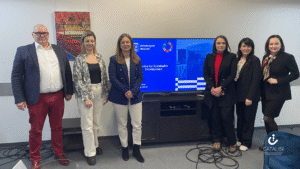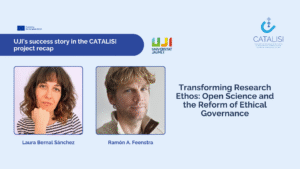
How does your background in Political Science has influenced your career in managing EU Research and Innovation projects?
I think that my degree in Political Science was instrumental in shaping my career in managing EU research and innovation projects, especially at the beginning. My academic background provided me with a strong foundation in understanding EU political dynamics, policy frameworks and EU decision-making processes. This knowledge has been invaluable in navigating the complexities of EU programmes and regulations. However, what I have learnt about projects has been shaped by years of working on different types of projects such as ERC projects, Marie Curie projects, INTERREG projects.
With your extensive experience in supporting organizations in managing EU projects, what would you say are the key challenges and rewards of such roles?
Throughout my career I have been involved in supporting both private and public organisations in managing EU projects. This involvement has allowed me to understand that each organisation has its own priorities and challenges when dealing with EU projects. Therefore, the key challenges often revolve around reconciling these different interests and ensuring effective communication and collaboration between partners. When you see in a project that different organisations – who may never have worked together before – are collaborating to achieve common goals and results, it is something valuable.
CATALISI aims to transform higher education institutions to become lighthouses of European values. Can you elaborate on what these “European values” mean to the project?
European values in the context of CATALISI include principles such as inclusiveness, diversity, sustainability and an overall commitment to excellence in research. The CATALISI project offers a unique opportunity for European higher education institutions to make a deep commitment to advancing these European values, reflecting a vision of higher education institutions that goes beyond academic achievement to encompass societal impact.
As the coordinator of the CATALISI Community of Practice (CoP), what do you envision as the most impactful contributions of the CoP members?
I envision that members of the CATALISI Community of Practice (CoP) can make an impact by fostering a collaborative environment for sharing best practices, innovative ideas and addressing common challenges. The CoP will serve as a hub for collective learning, creating a space where diverse perspectives converge to drive positive change in higher education institutions across Europe.

What would be your call to action for potential members of the CATALISI CoP from education and research to digitalization and policy-making, and why should they join this community?
By participating in the CoP, individuals, experts and/or experienced professionals, can engage in meaningful discussions, share their expertise in a wide range of R&I areas, from open science, public engagement and outreach of research, to lifelong learning, digitisation of research, talent support and circulation, gender and inclusion plans. Today an institutional transformation pathway towards these areas cannot be achieved alone, in a vacuum, it requires a broaden support coming from ideas, stories, methods of a broaden Community of peers.
In your opinion, what qualities and expertise make an individual an ideal fit for the CATALISI CoP, and how do you see the diverse backgrounds of CoP members enriching the community’s discussions and outputs?
This is quite a challenging question. I would not speak of an ideal CATALISI CoP member in terms of expertise, any background is welcome. I think the ideal CATALISI CoP member is someone who strongly believes in the potential of mutual learning from the experiences of a wide community of stakeholders, who wants to contribute with his/her knowledge and practices on these topics and benefit at the same time from those of others. The ability to collaborate effectively, a passion for promoting European values and a commitment to continuous learning are qualities that will enrich the dynamics of the CoP.
Where do you see the CATALISI project in the next 3 years, and what lasting impact do you hope it will have on European Higher Education Institutions?
In the next 3 years, I believe that CATALISI Higher Education Institutions have planted seeds for their institutional transformation, defined their own pathway which becomes a catalyst for future profound changes also in the long run , fostering an environment where planning and achieving a transformation becomes easier and easier.
How does APRE’s role in CATALISI, especially in knowledge sharing, mutual learning, and coordinating the Community of Practice, contribute to the broader objectives of the project?
APRE’s role is meant to facilitate the creation of this environment, contributing to knowledge sharing, mutual learning, in providing a methodology for capacity building, as well as by facilitating collaboration and information exchange amongst the CoP.



